|
|
|
Sort Order |
|
|
|
Items / Page
|
|
|
|
|
|
|
| Srl | Item |
| 1 |
ID:
117498
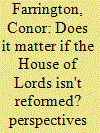

|
|
|
|
|
| Publication |
2012.
|
| Summary/Abstract |
In May 2011 the Coalition government published a draft bill for reform of the House of Lords, proposing an upper chamber composed of 80% elected and 20% appointed members serving for single 15-year terms. These plans reflect aspects of the stated positions of the main political parties, votes in the House of Commons, and broader political and scholarly debates over the past decade. Nevertheless, there is significant opposition from across the political spectrum, and there is a significant possibility that the proposed reforms will not be enacted before the next general election. This article draws on the views of participants (including three current peers) in a Symposium at Trinity Hall, Cambridge to argue that the likely failure of the reforms may be less disastrous than many suppose. Especially since the 1999 reforms, the House of Lords is in many ways a more active and legitimate chamber than is commonly realised.
|
|
|
|
|
|
|
|
|
|
|
|
|
|
|
|
| 2 |
ID:
111662
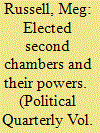

|
|
|
|
|
| Publication |
2012.
|
| Summary/Abstract |
In May 2011, Britain's Conservative/Liberal Democrat coalition government published proposals for reform of the House of Lords. In a White Paper and draft bill they set out detailed plans for a largely or wholly elected second chamber. These marked the latest stage in a long-running debate on Lords reform. The government's proposals aim to change the composition of the second chamber, suggesting that there will be no change to its powers or the conventions governing relations with the House of Commons. But this expectation has been disputed. The House of Lords presently does not make full use of its powers, and many anticipate that it would if its members became elected. This paper reviews the composition of all second chambers internationally, showing that wholly directly elected chambers make up the minority, and that both mixed chambers and indirect election are common. It then reviews the formal powers of all largely and wholly elected chambers. This shows that amongst parliamentary systems the formal powers of the House of Lords are relatively great. But second chamber powers, as well as their composition, vary widely.
|
|
|
|
|
|
|
|
|
|
|
|
|
|
|
|
| 3 |
ID:
092643
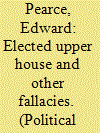

|
|
|
|
|
| Publication |
2009.
|
| Summary/Abstract |
All fashionable political talk is of an elected House of Lords. Doing this smart, new unthought-out thing, says Edward Pearce, means dissolving the reliably rebellious upper house regularly rejecting bad bills from Tory and Labour governments, for a House as submissive as the Commons. Second-line politicians will replace the difficult individual people, soldiers, doctors, academics, scientists, assorted and distinguished experts who, by lucky muddle, go there today.
|
|
|
|
|
|
|
|
|
|
|
|
|
|
|
|
| 4 |
ID:
138888
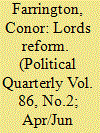

|
|
|
|
|
| Summary/Abstract |
The failure of the Coalition government's attempt to reform the House of Lords has by no means taken further reform off the political agenda. The commitment to installing an elected upper chamber is still widely shared across the political spectrum, on the basis of perceptions that the House of Lords lacks democratic legitimacy. Against this view, this article considers recent literature upon non-electoral representation, deliberative democracy and bicameralism, which together highlight the possibility of an unelected second chamber playing a legitimate role within a wider (democratic) system of government. The article then considers the House of Lords from this perspective, reflecting on changes in the upper chamber since the 1999 reforms and evaluating its role within the wider political system. The paper concludes by suggesting that political debate should focus upon small-scale reforms to ensure that the Lords becomes more effective, representative and legitimate, within the constraints of its present role.
|
|
|
|
|
|
|
|
|
|
|
|
|
|
|
|
| 5 |
ID:
092367
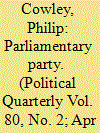

|
|
|
|
|
| Publication |
2009.
|
| Summary/Abstract |
The Conservative parliamentary party will fulfill three important functions for any incoming Conservative government: it will be the focus of attention for the national media; it will be the bulk vote that will deliver its legislative programme; it will form the talent pool from which members of any incoming government will be recruited. A majority Conservative government could see a majority of its MPs newly elected, with more Conservative women and ethnic minority MPs than ever before (although there will be little change in the socio-economic background of their MPs). These new MPs will present problems in terms of party management, although they will be less likely to rebel than longer-serving MPs. There are also relatively few signs of discontent among incumbent Conservative MPs (the article identifies the most rebellious Conservative MPs). Any new Conservative government will also have to deal with a reformed House of Lords, in which it will no longer have a majority.
|
|
|
|
|
|
|
|
|
|
|
|
|
|
|
|
| 6 |
ID:
174012
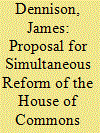

|
|
|
|
|
| Summary/Abstract |
The disproportional electoral system of the House of Commons is increasingly contested, while the undemocratic composition of the House of Lords has been criticised for a century. I first argue that simultaneous reform of both chambers creates the opportunity for far more optimal outcomes than possible under attempts to reform just one chamber. I then argue that bicameralism should continue so that the UK can be represented in two, currently convoluted, ways: as a singular polity in partisan terms and as both an aggregate of constituencies and union of nations, in geographic terms. The former would best take place in a reformed House of Commons, responsible for government formation, and composed of around 300 MPs elected by ‘pure’ proportional representation. The latter would best take place in a reformed House of Lords of around 300 peers, elected by plurality voting from single‐member constituencies. Together, these reforms would improve governance, representation, legitimacy, accountability and the robustness of the union, while retaining celebrated facets of the status quo such as simplicity and the direct constituency link.
|
|
|
|
|
|
|
|
|
|
|
|
|
|
|
|
| 7 |
ID:
095292
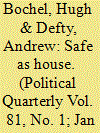

|
|
|
|
|
| Publication |
2010.
|
| Summary/Abstract |
Social policy is of key importance to contemporary society, accounting for two thirds of public expenditure and, through provision such as the NHS, pensions, benefits, schools, universities and social care, touching on the lives of much of the population on a daily basis. It has also been one of the areas where the Conservative party have sought to change their image, and to some extent policies, under David Cameron. Drawing upon a range of evidence, including interviews with more than ten per cent of the House of Commons and the House of Lords, this article examines the potential challenges for a Conservative government of either stance, focusing on the extent of possible support for the Conservatives' approach to social policy amongst three key groups: the public, MPs, and members of the House of Lords.
|
|
|
|
|
|
|
|
|
|
|
|
|
|
|
|
|
|
|
|
|